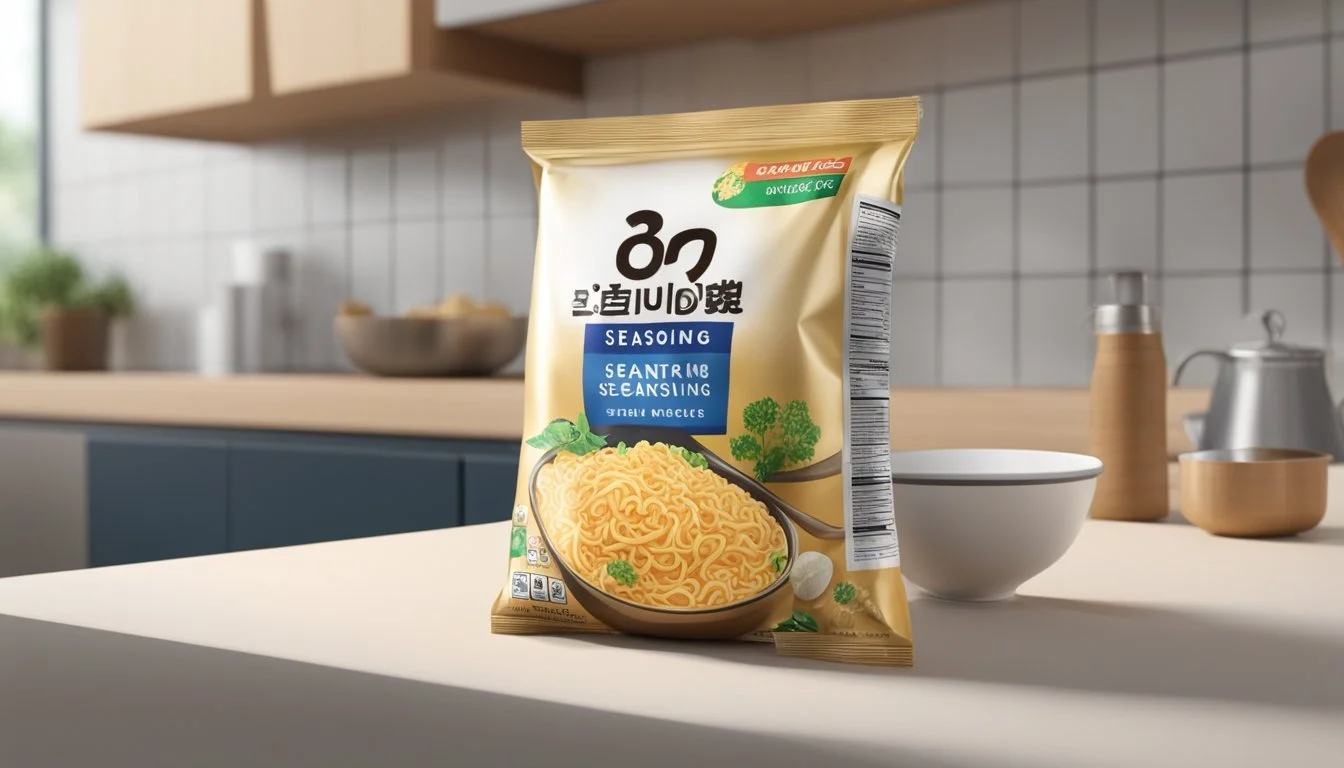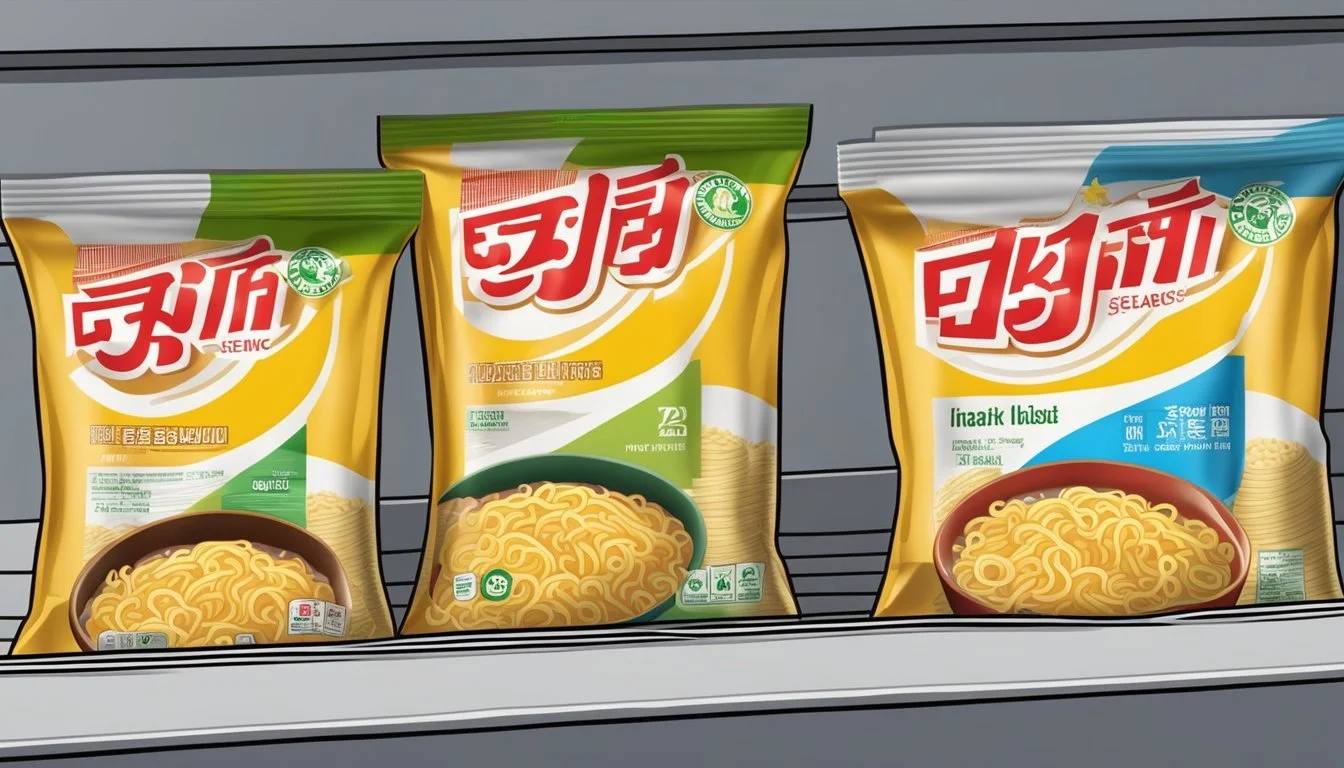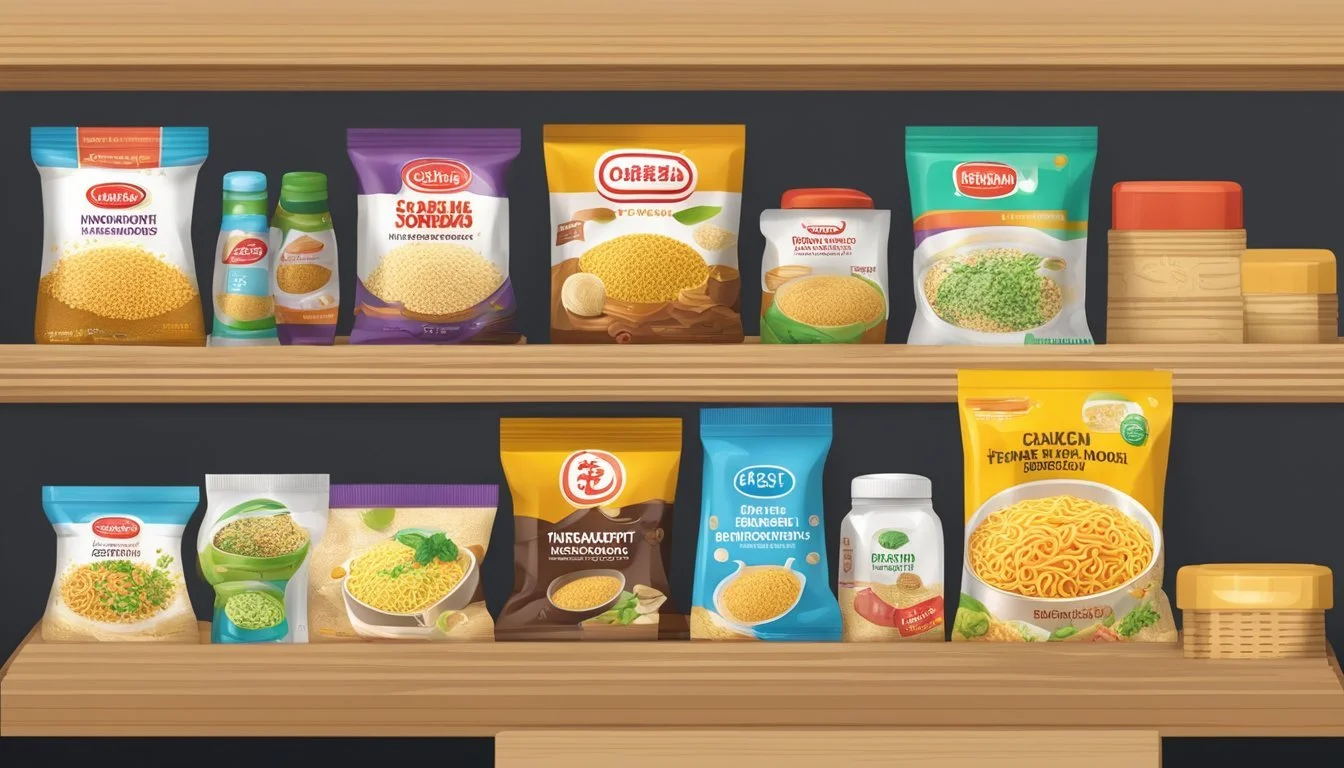Does Instant Noodle Seasoning Expire? Essential Facts You Need to Know
When it comes to instant noodles, many wonder about the lifespan and safety of the seasoning packets that accompany them. Instant noodle seasoning does expire, typically losing its potency and flavor quality after the expiration date. The shelf life of these seasoning packets generally aligns with that of the noodles, which is often between one to two years.
It’s important to note that the expiration date serves as a guideline for optimal taste and freshness. Past this date, while the seasoning may not be harmful, it might lose its intended flavor. The risk of consuming expired seasoning includes the potential presence of mold or clumping if the packaging has been compromised.
Understanding the nuances of these dates allows consumers to make informed decisions about their pantry staples. When storing instant noodles and their seasonings, ensure they’re kept in a cool, dry place to extend their usability and maintain their quality for as long as possible.
Understanding Food Expiration
When considering food expiration, it's crucial to understand the distinction between expiration dates and shelf life, recognize spoilage indicators, and know the role of preservatives. These aspects help ensure food safety and quality.
Expiration Date versus Shelf Life
The expiration date is a key indicator provided by manufacturers. It usually signals the end of the period during which the product maintains optimal quality and safety.
Shelf life, on the other hand, refers to how long a product remains edible and retains its desired characteristics. Instant noodles, for example, can often be safely consumed past their expiration date if stored correctly, though the taste and texture might degrade.
Consumers should check both dates to make informed decisions. Commonly, an expiration date is printed on the packaging and may vary based on storage conditions.
Food Safety and Spoilage Indicators
Food safety involves preventing foodborne illness caused by consuming spoiled or contaminated food. Instant noodles and their seasonings can show spoilage indicators such as mold, discoloration, or an unusual odor.
Mold growth and bacterial contamination are primary concerns affecting food safety.
If instant noodle seasoning has a strange smell or appearance, it is best not to use it. Even if expired, proper storage significantly reduces the risk of food poisoning by keeping harmful microorganisms at bay.
Preservatives in Instant Noodles
Preservatives are substances added to food to extend shelf life and prevent spoilage. They play a significant role in the durability of instant noodles and their seasonings. Common preservatives in instant noodles include antioxidants, which prevent the oxidation of fats, and antimicrobial agents, which inhibit the growth of bacteria and mold.
These additives ensure the seasoning stays safe even after the expiration date, provided the packet remains sealed and stored in cool, dry conditions. However, reliance on preservatives should not replace vigilance in checking for signs of spoilage or contamination.
Understanding these factors enables consumers to use instant noodle seasonings safely and enjoyably, even when considering expiration dates and preservative roles.
Instant Noodles Composition and Durability
Instant noodles, often made from wheat flour, salt, and other ingredients, undergo a dehydration process that extends their shelf life significantly.
Ingredients in Instant Noodles
Instant noodles typically include wheat flour, water, salt, and sometimes eggs. Wheat flour forms the primary base, providing structure and texture. Salt enhances flavor and helps in the dehydration process.
Some noodles are enriched with additional nutrients like iron and vitamins. Various toppings such as seafood, meat, and vegetables are added to enhance flavor and nutritional value. Preservatives are often included to prolong shelf life and maintain quality.
The Dehydration Process
The dehydration process is crucial for the longevity of instant noodles. The noodles are subjected to a rapid drying method, either through frying or air drying. Frying involves cooking the noodles in hot oil which reduces moisture content quickly, making them shelf-stable.
Air drying is a heat-based method that removes moisture without adding fat. This process ensures that the noodles do not harbor mold or bacteria, thus extending their durability. The dehydration process also helps lock in flavors and keeps the noodles crisp until they are rehydrated during cooking.
Proper Storage Techniques
Proper storage extends the shelf life of instant noodle seasoning and maintains its taste and freshness. Key storage tips include keeping the seasoning in a cool, dry place, using airtight containers, and considering refrigeration or freezing options.
Impact of Storage on Freshness and Taste
Storing instant noodle seasoning correctly is vital for preserving its flavor. Exposure to moisture leads to clumping, while heat causes loss of potency. To retain its original taste, keep the seasoning packets in a cool, dry place. This prevents moisture accumulation and preserves the spices and herbs.
Airtight containers or sealed Ziploc bags are effective in maintaining freshness. These storage methods block air, limiting exposure to humidity and preventing spoilage. Placing packets in a pantry or cupboard away from heat sources ensures optimal conditions for preserving quality.
Refrigeration and Freezing Options
For longer storage, consider refrigeration or freezing. Both methods significantly extend the shelf life of instant noodle seasoning. Store seasoning packets in airtight containers or Ziploc bags before refrigerating or freezing to prevent moisture infiltration.
Refrigeration is practical for short-term storage. This method slows down the degradation process, maintaining freshness. Freezing is suitable for even longer periods. It halts bacterial growth and preserves the seasoning's taste profile.
Label containers with the date of storage to keep track and use the oldest seasoning first. Both refrigeration and freezing prevent spoilage and waste, ensuring quality seasoning whenever needed.
Packaging and Airtight Containers
Effective packaging is essential for preserving instant noodle seasoning. Use airtight containers to limit air exposure, which maintains the seasoning's potency. Ziploc bags are another excellent option, offering flexibility and ease of use.
Store packets in durable, food-safe containers. Ensure the containers are clean and dry before use. Glass jars with airtight lids, vacuum-sealed bags, and plastic containers with tight seals are all suitable options.
A well-sealed container extends the seasoning's lifespan by minimizing contact with external elements. Keeping the seasoning in its original packaging, if unopened, also provides added protection against moisture and contamination.
Determining Instant Noodle Quality
Identifying the quality of instant noodles involves examining sensory indicators and understanding the risks associated with consuming expired noodles. Pay attention to aspects like taste, texture, odor, and visual signs like mold growth or discoloration.
Sensory Indicators of Noodle Quality
The taste and texture of instant noodles can change significantly over time. Fresh noodles have a distinct taste and a springy texture.
Odor is a critical indicator of freshness. Noodles with an off or rancid smell should not be consumed. Discoloration can also flag quality issues. Fresh noodles should maintain a consistent color; any grayish or uneven coloring might indicate spoilage. Mold growth, while rare, is a clear signal that the noodles are unsafe to eat.
Risks of Consuming Expired Noodles
Consuming expired ramen can have minimal to severe consequences. Expired noodles may have a reduced nutritional value and an unpleasant taste.
In some cases, they may still be safe if stored properly. However, there is a risk of developing an upset stomach or other digestive issues if harmful bacteria have developed. Always inspect for any unusual changes in sensory indicators to assess edibility.
Specifics of Instant Noodle Seasoning Packets
Instant noodle seasoning packets contain a variety of ingredients designed to create flavorful and aromatic broth.
Typically, these packets include salt, sugar, powdered soy sauce, MSG (monosodium glutamate), spices, and dried vegetable bits.
These ingredients are generally stable and have a long shelf life. Sodium is a major component and acts as a preservative.
The quality of the seasoning can degrade over time. Exposure to air and moisture may cause clumping or loss of flavor.
In terms of nutritional content, instant noodle seasonings are high in sodium, which helps to enhance taste but may not be the most nutritious choice.
To maintain the best quality, it's advisable to store seasoning packets in a cool, dry place. This can help prevent mold or bacterial growth, ensuring they're safe to eat.
Use original seasoning packets before the noodle's expiration date for optimal taste. While they may be safe to eat beyond this date, the flavors might not be as vibrant or appealing.
Managing Leftover Instant Nude2ls and Seasonings
Managing leftover instant noodles and their seasonings helps extend their shelf life and ensures they remain safe to consume. Attention to proper storage techniques and creative ways to reuse seasoning packets can make a big difference.
Leftover Fresh and Pre-Cooked Noodles
Fresh and pre-cooked noodles should be stored in a cool, dry place away from direct sunlight.
Keep fresh ramen noodles in the refrigerator to preserve their texture and flavor. Use airtight containers to protect against moisture and contamination. If using pre-cooked noodles, ensure they are completely cooled before placing them in an airtight container, preventing mold growth.
Label containers with the storage date to monitor freshness. Properly stored fresh noodles can last several days, while pre-cooked noodles can be safe for up to a week.
Reusing Unexpired Seasonings
Unexpired seasoning packets from instant noodles can be repurposed in various dishes.
Store seasonings in a cool, dry place within airtight containers to keep them dry and free from pests. They can enhance flavors in soups, stews, and marinades. Add a pinch to scrambled eggs for extra savoriness.
Ideas for reuse:
Add to soups for a quick flavor boost
Mix with breadcrumbs for coating meats
Incorporate into stir-fries for seasoning
Check the expiration dates and store properly to maximize their longevity and usability.
Common Concerns and Misconceptions
When considering the longevity of instant noodle seasoning, it's important to understand several common concerns and misconceptions that people often have. This section addresses key points related to shelf life, preservation differences between types of noodles, and widespread myths about expiry dates.
Extended Shelf Life of Instant Noodles
Instant noodles are known for their extended shelf life due to the dehydration process. Unopened packets often last beyond their expiration date, sometimes up to two years if stored correctly. The seasoning packets, being dry, share this extended shelf life. However, for optimal taste and quality, they should be used within 18 months. Proper storage means keeping them in a cool, dry place free from moisture.
Difference Between Dry and Fresh Noodles
There's a significant difference between dry and fresh noodles in terms of preservation. Dry instant noodles and seasoning packets, because of their low moisture content, can last much longer. Fresh noodles, on the other hand, contain moisture that can lead to quicker spoilage and mold growth. Fresh noodles require refrigeration and have a shorter lifespan. It's crucial to check both types for any signs of spoilage, like discoloration or off smells.
Myths About Instant Noodles Expiry
Several myths exist regarding the expiry of instant noodles and their seasoning. One common misconception is that they become unsafe immediately after the expiration date. In reality, they often remain safe to eat for several months. Another myth is that the seasoning loses all its flavor post-expiry. While some flavor loss can occur, the seasoning generally retains its taste if stored properly. Always check for physical signs of spoilage, such as an unusual smell or clumping, to ensure food safety.
External Factors Affecting Noodle Shelf Life
Proper storage conditions are crucial for maximizing the shelf life of instant noodles. Factors such as temperature, humidity, and pest control play significant roles in preserving both the noodles and their seasoning packets.
Effects of Temperature and Humidity
Extreme temperatures can degrade instant noodles and their seasoning. High temperatures accelerate the oxidation of fats and oils, leading to rancidity. Conversely, low temperatures can cause moisture to condense inside the packaging, promoting mold growth. Humidity is another critical factor; noodles stored in high-humidity environments are prone to absorb moisture, causing them to lose their crisp texture and become stale.
To maintain optimal quality, noodles should be stored in cool, dry locations, away from direct sunlight. Keeping them in an environment with stable temperatures and low humidity prevents flavor degradation and pathogen growth.
Preventing Infestation and Contamination
Bugs, such as pantry moths and weevils, can infest instant noodles if they are not stored properly. Contamination from pests or bacteria like E. coli can occur when packaging is damaged or compromised.
Using airtight containers or resealable bags offers added protection. Regularly inspecting storage areas for signs of pest activity is also beneficial. Ensuring that noodles are kept in clean, dry, and contained environments minimizes the risk of infestations and microbial contamination.









